Nearly 500 people with PWS are needed this year to fill PWS specific clinical trials. These trials are incredibly important to the PWS community and are necessary in order to bring treatments for some of the most challenging aspects of PWS. Here, we debunk a few of the most common clinical trial myths.
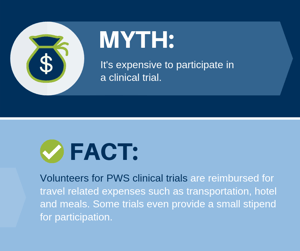 Myth #1: It's expensive to participate in a clinical trial.
Myth #1: It's expensive to participate in a clinical trial.
Fact: Volunteers for PWS clinical trials are reimbursed for expenses related to clinical trial participation. This includes expenses such as airfare, hotel, transportation to and from the clinic, and meals. Some trials even provide a small stipend for participation.
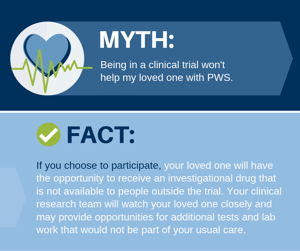 Myth #2: Being in a clinical trial won't help my loved one with PWS.
Myth #2: Being in a clinical trial won't help my loved one with PWS.
Fact: If you choose to participate, your loved one will have the opportunity to receive an investigational drug that is not available to people outside the trial. Your clinical research team will watch your loved one closely and may provide opportunities for additional tests and lab work that would not be part of your usual care.
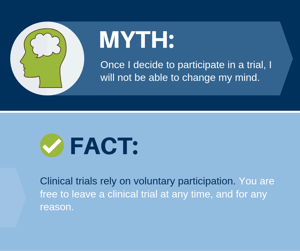 Myth #3: Once I decide to participate in a trial, I will not be able to change my mind.
Myth #3: Once I decide to participate in a trial, I will not be able to change my mind.
Fact: Clinical trials rely on voluntary participation. You are free to leave a clinical trial at any time and for any reason.
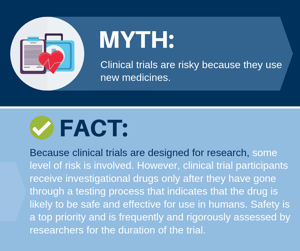 Myth #4: Clinical trials are risky because they use new medicines.
Myth #4: Clinical trials are risky because they use new medicines.
Fact: Because clinical trials are designed for research, some level of risk is involved. However, clinical trial participants receive investigational drugs only after they have gone through a testing process that indicates that the drug is likely to be safe for use in humans. Safety is a top priority and is frequently and rigorously assessed by researchers for the duration of the trial.
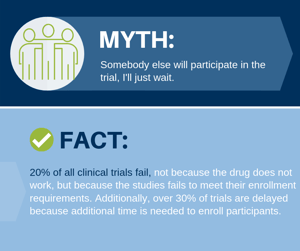 Myth 5: Somebody else will participate in the trial, I’ll just wait.
Myth 5: Somebody else will participate in the trial, I’ll just wait.
Fact: 20% of all clinical trials fail, not because the drug does not work, but because the studies fails to meet their enrollment requirements. Additionally, over 30% of trials are delayed because additional time is needed to enroll participants.
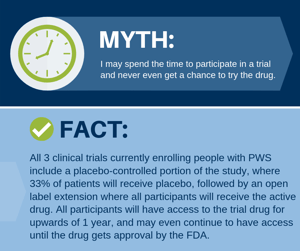 Myth #6: I may spend the time to participate in a trial and never even get a chance to try the drug.
Myth #6: I may spend the time to participate in a trial and never even get a chance to try the drug.
Fact: All 3 clinical trials currently enrolling people with PWS include a placebo-controlled portion of the study, where 33% of patients will receive placebo. This will be followed by an open label extension where all participants will receive the active drug. All participants will have access to the trial drug for upwards of 1 year and may even continue to have access until the drug gets approval by the FDA.








